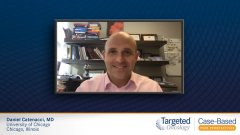
Second-Line Treatment Options in Gastric Cancer
Daniel Catenacci, MD, examines factors that help decide when to switch treatment from first to second line, and when to change mechanism of action in treating gastric carcinoma.
Daniel Catenacci, MD: The change to second-line therapy is an important one, and it’s one that’s often discussed because only around 40% to 50% of all patients actually get second-line therapy in the databases in this country, and also globally in large studies. Part of that is due to the aggressiveness of the disease no doubt, where patients are getting treated, and even if they have a response, they can get rapid progression and decline quite rapidly. Even when you’re paying attention, you can miss your window of switching to next-line therapy.
I strategize when the patient is first diagnosed and profile the patient’s tumor, so that you know what you’re going to do in each line of therapy and plan it out. As a standard of care, what are the sequences that you’re going to use? We always tell the patients as well of course that there are a number of factors that go into what’s going to trigger a change to next-line therapy. Those include how you’re feeling and how you’re doing. And if there’s truly a toxicity that we just cannot manage, and/or there’s progression of the cancer in that setting, then clearly you would switch to another line of therapy.
In addition to how one’s feeling from a cancer-related standpoint, and symptom-wise, and also tolerability, we are always closely tracking tumor markers. We followed CEA [carcinoembryonic antigen] and the CA [cancer antigen] 19-9 tumor markers. They often are what’s going up earliest, and heralding a progression even before you see it on scans or with patients’ symptoms. And that’s preparing us to not do another scan 3 months later, because that’s when you’re going to miss your chance and miss your opportunity to switch. There you would be doing no more than a 2-month scan, and sometimes there I’ll do a 6-week scan after 3 cycles of a FOLFOX [folinic acid, fluorouracil, oxaliplatin]-based therapy to not miss your chance.
Of course, we look at CT scans, but many times patients have peritoneal disease that’s difficult to follow on scans. And it’s more of a sense of how a patient is doing, how the tumor markers are doing, and evaluating that in the absence of many changes on the CT scan, so that you don’t miss your chance to change to the next active therapy.
Transcript edited for clarity.
Case: A 71-Year-Old Man With HER2+ Gastric Cancer
Initial Presentation
- A 71-year-old man complained of a 3-month history of abdominal pain and bloating, a sensation of fullness
- PMH: HTN, medically controlled; colonoscopy at age 53 was unremarkable; no family history of cancer
- PE: patient appeared tired, abdominal distention; otherwise unremarkable
Clinical Workup
- Labs: Hb 9.7 g/dL, plt 111 x 109/L; other lab values WNL
- Upper endoscopy with biopsy: showed an ulcerative lesion 5.8 cm mass in the cardia of the stomach; biopsy confirmed gastric adenocarcinoma
- CT of chest/abdomen/pelvis confirmed a 5.8 cm lesion with indistinct margins in the cardia of the stomach; 2 suspicious hepatic lesions
- EUS: gastric cancer lesion confirmed invasion of the muscularis propria
- Mutational testing: MSI high, PD-L1 0%, HER2 3+ by IHC
- Stage IV gastric adenocarcinoma; ECOG 2
Treatment
- He was started on XELOX/CAPOX + trastuzumab
- Dose reduced due to grade 2 diarrhea; unable to control after 4 cycles; discontinued treatment
- Treatment initiated with a pembrolizumab
- After 24-months of treatment without progression of disease pembrolizumab was discontinued
- The patient was started on trastuzumab deruxtecan; repeat HER2 expression testing was not indicated












































